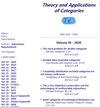Desenvolvimento de um Ambiente Virtual de Aprendizagem à Luz do Enfoque Sistêmico
IF 0.4
4区 数学
Q4 MATHEMATICS
引用次数: 8
Abstract
With growing options of Information and Communication Technologies (ICTs) on the Internet, there is a growing interest in using them to improve, expand and facilitate educational processes, be it in face-to-face learning or distance learning. In order to integrate multiple media, software and resources, facilitate interactions between teachers and students, as well as between people and objects of knowledge, within the environment of the Internet, different processing system solutions have been developed, especially since 1990, in the form of Learning Management Systems (LMS). Some examples of LMS include: MOODLE, TelEduc and Blackboard. The high levels of interest in researching and building LMS usually stems from areas such as Education, Information Technology and Communication. However, this article presents the unique and innovative aspects of the LMS NAVI, Interactive Learning Environment that was developed in Brazil at the UFRGS School of Business Administration by a core of researchers and technicians from different backgrounds, but especially from the field of Administration. The constructed virtual environment brings in tow the influences of concepts derived from Management theory, especially Systems Theory. It differs from LMSs, which are known for the systemic approach of their organizational structures (and navigation), rather than the traditional linear and mechanistic approach. For this reason, it has more advanced properties, especially in terms of adaptability, flexibility, recursion and multidimensionality, as opposed to the rigidity, linearity, specificity and onedimensionality of traditional learning platforms. Due to its innovative character, the platform has received growing academic and professional support, and it is believed that it could constitute a genuine and innovative educational, conceptual and technological solution in the Brazilian context.基于系统方法开发虚拟学习环境
随着互联网上信息和通信技术(ict)的选择越来越多,人们越来越有兴趣利用它们来改进、扩大和促进教育过程,无论是面对面学习还是远程学习。为了整合多种媒体、软件和资源,促进教师和学生之间以及人与知识对象之间的互动,在互联网环境下,不同的处理系统解决方案已经开发出来,特别是自1990年以来,以学习管理系统(LMS)的形式。LMS的一些例子包括:MOODLE、TelEduc和Blackboard。对研究和建立LMS的高度兴趣通常来自教育、信息技术和通信等领域。然而,本文介绍了LMS NAVI(交互式学习环境)的独特和创新方面,它是由巴西UFRGS工商管理学院由来自不同背景的核心研究人员和技术人员开发的,特别是来自管理领域。构建的虚拟环境带来了管理理论尤其是系统理论概念的影响。它不同于lms, lms以其组织结构(和导航)的系统方法而闻名,而不是传统的线性和机械方法。因此,与传统学习平台的刚性、线性、专一性和单维性不同,它具有更高级的特性,特别是在适应性、灵活性、递归性和多维性方面。由于其创新性,该平台得到了越来越多的学术和专业支持,相信它可以在巴西的背景下构成一个真正的和创新的教育、概念和技术解决方案。
本文章由计算机程序翻译,如有差异,请以英文原文为准。
求助全文
约1分钟内获得全文
求助全文
来源期刊

Theory and Applications of Categories
MATHEMATICS, APPLIED-MATHEMATICS
CiteScore
1.30
自引率
0.00%
发文量
0
期刊介绍:
The journal Theory and Applications of Categories will disseminate articles that significantly advance the study of categorical algebra or methods, or that make significant new contributions to mathematical science using categorical methods. The scope of the journal includes: all areas of pure category theory, including higher dimensional categories; applications of category theory to algebra, geometry and topology and other areas of mathematics; applications of category theory to computer science, physics and other mathematical sciences; contributions to scientific knowledge that make use of categorical methods.
 求助内容:
求助内容: 应助结果提醒方式:
应助结果提醒方式:


